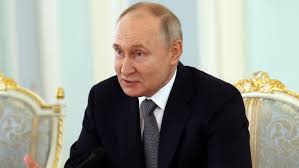Following Vladimir Putin’s invasion of Ukraine two years ago, more than three dozen countries, led by the West, imposed unprecedented economic sanctions on Russia. These sanctions covered a broad spectrum of sectors, including energy, finance, technology, travel, and shipping. The primary aim was to increase the cost to Russia of continuing the war. This article delves into the scope and impact of these sanctions, examining their effectiveness and future implications.
Introduction
In February 2022, the world watched as Russian forces invaded Ukraine, triggering a swift and unified response from the international community. The sanctions imposed on Russia were unlike any seen before for a nation of its size, aiming to cripple its economy and pressure it to cease its military aggression. But how effective have these measures been, and what has been their impact on Russia and the global economy?
The Scope of Sanctions
Comprehensive Coverage
The sanctions targeting Russia were extensive and multifaceted. They aimed to cut off significant revenue streams and disrupt vital economic sectors.
- Energy and Commodities: Restrictions were placed on oil and gas exports, a critical source of income for Russia.
- Finance: Major Russian banks were excluded from the SWIFT international payment system, severely hampering financial transactions.
- Technology: Export controls on advanced technology limited Russia’s access to crucial components for its industries.
- Travel and Shipping: Airspace bans and shipping restrictions isolated Russia from international logistics networks.
International Coordination
The sanctions were a coordinated effort by more than three dozen countries, including the United States, European Union, United Kingdom, Canada, Japan, and Australia. This level of international cooperation was unprecedented, aiming to maximize the impact on the Russian economy.
Economic Impact on Russia
Decline in GDP
The sanctions led to a significant contraction of the Russian economy. According to the International Monetary Fund (IMF), Russia’s GDP shrank by 6% in the first year following the invasion.
Rising Inflation
With limited access to international markets and goods, inflation in Russia soared. The cost of living increased dramatically, affecting the average Russian citizen.
Devaluation of the Ruble
The Russian ruble experienced substantial devaluation due to the economic isolation and capital flight. This devaluation eroded the purchasing power of Russian consumers and businesses.
Energy Sector Hit Hard
Sanctions on oil and gas exports forced Russia to seek alternative markets, often selling at discounted prices. This reduced revenue from one of its most vital economic sectors.
Global Repercussions
Energy Markets
Sanctions on Russian energy exports caused disruptions in global energy markets. Europe, heavily reliant on Russian gas, faced energy shortages and price spikes, prompting a shift towards alternative energy sources.
Supply Chain Disruptions
Restrictions on Russian shipping and exports affected global supply chains, particularly in commodities such as wheat and metals. This led to increased prices and shortages in various parts of the world.
Inflationary Pressures
The global economy experienced inflationary pressures due to the combined effects of energy price hikes and supply chain disruptions. Central banks worldwide had to adjust monetary policies to manage these challenges.
Effectiveness of Sanctions
Pressure on the Russian Government
The sanctions aimed to exert economic pressure on the Russian government to change its course in Ukraine. While they have significantly impacted the Russian economy, the government has taken measures to mitigate the effects, such as seeking new trade partners and bolstering domestic industries.
Public Opinion and Social Unrest
Economic hardships resulting from the sanctions have led to growing discontent among the Russian populace. However, the extent to which this has translated into pressure on the government remains limited due to strict state control over dissent.
Long-term Economic Damage
The long-term damage to the Russian economy is substantial. Isolation from Western technology and markets has hindered growth prospects and innovation, potentially stalling economic progress for years to come.
Lessons Learned and Future Directions
Need for Continued Pressure
To maintain the effectiveness of sanctions, the international community must remain united and continue to enforce and potentially escalate measures if necessary.
Diversifying Energy Sources
For countries dependent on Russian energy, diversifying energy sources is crucial to reduce vulnerability to geopolitical tensions. This includes investing in renewable energy and alternative suppliers.
Strengthening Alliances
The sanctions regime has underscored the importance of international alliances and cooperation. Strengthening these relationships is essential for addressing future global challenges.
Supporting Ukraine
Beyond sanctions, providing economic and military support to Ukraine remains vital in countering Russian aggression and stabilizing the region.
The economic sanctions imposed on Russia following its invasion of Ukraine were unprecedented in their scope and impact. While they have inflicted significant damage on the Russian economy, the effectiveness of these measures in achieving their political goals remains a topic of debate. Moving forward, maintaining international unity and adapting strategies to evolving circumstances will be key to sustaining pressure on Russia and supporting Ukraine.




